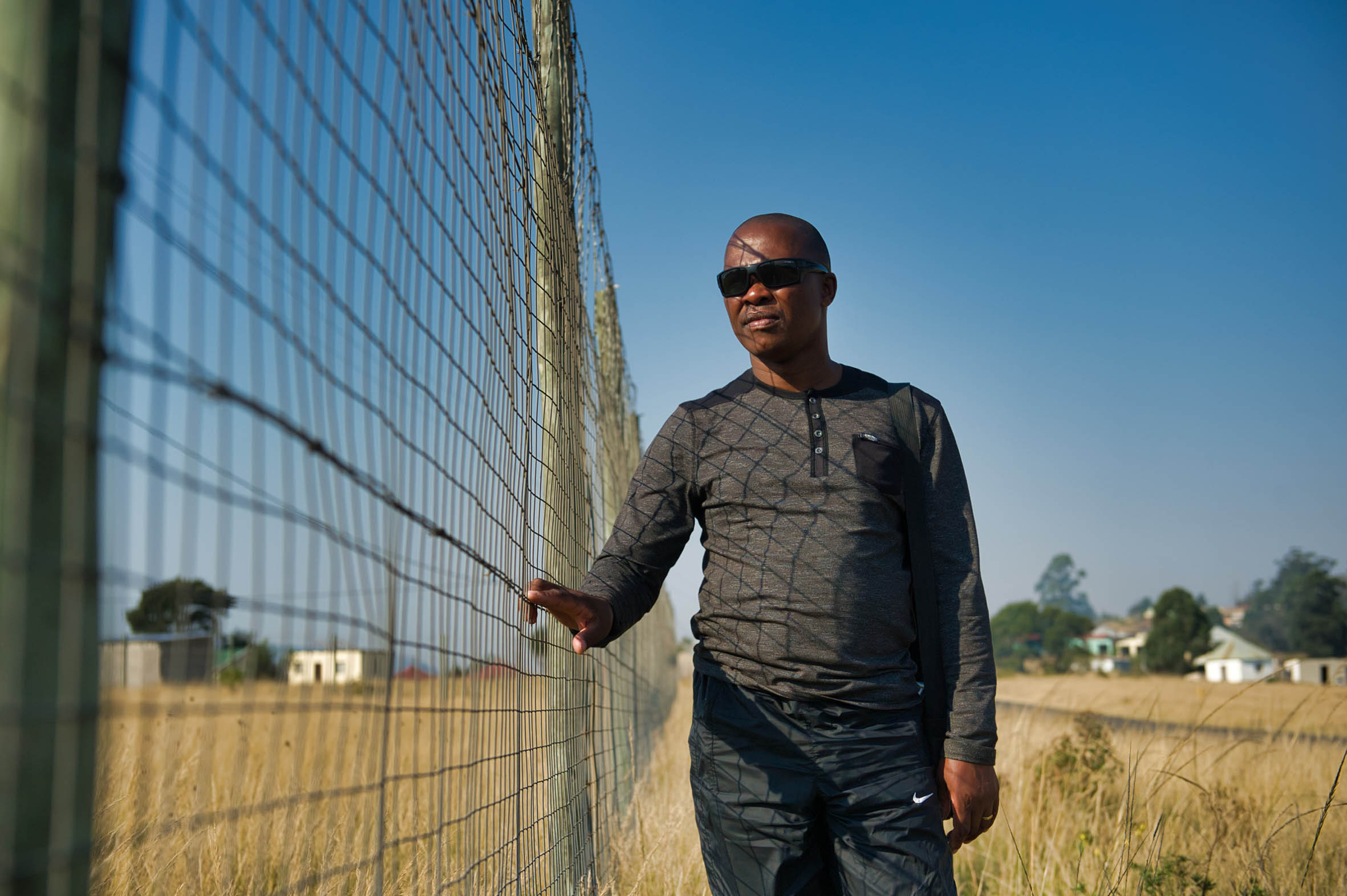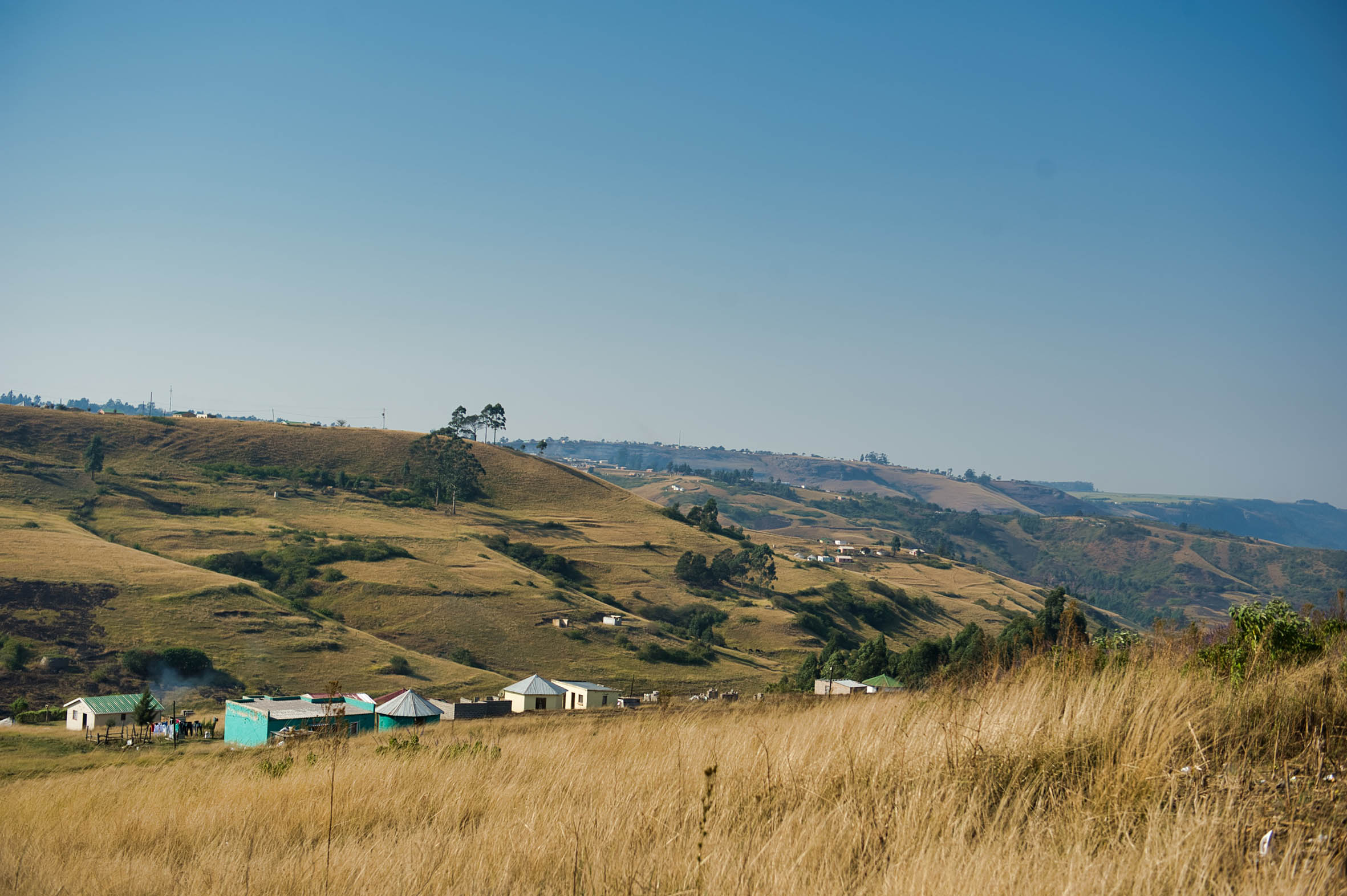The residents of KwaDlovinga
Thembinkosi Dwayisa knows all about the expropriation of land without compensation.
Dwayisa, a former newspaper photographer, had to watch as nearly two hectares of his maternal grandfather’s land at Izingolweni in southern KwaZulu-Natal was taken away.
The land, which had been used by the community for almost half a century, was expropriated in 2015 by the Vukuzithathe tribal authority in KwaDlovinga, under which his home, inland from Port Shepstone, falls.
Dwayisa (50) lost the land — which had originally been used by his grandfather, Nqaba Ntobela, for grazing — thanks to a new regulation stipulating that any land that is not fenced, ploughed or built on for three years is forfeited to the tribal authority.

[Land that belonged to Thembinkosi Dwayisa’s family was taken by Vukuzithathe tribal authority. (Delwyn Verasamy/M&G)]
The regulation, introduced several years ago, was implemented by the tribal authority despite an existing arrangement that allowed Dwayisa’s family not to fence the land to give the rest of the inhabitants access to it.
Dwayisa’s land, which had been in his mother’s family for “as far back as anybody can remember”, now houses a community hall and several families from outside the KwaDlovinga area, which falls under Inkosi MaNgcobo Cele. A church has also been given permission to build on the site.
“It’s so painful to see this happening,” Dwayisa told the Mail & Guardian this week. “This was my grandfather’s land. I grew up knowing that. This was meant to be a treasure that I could pass on to my grandchildren. It is their heritage.
“This was land that was given to my great-grandfather for ploughing and grazing. It has been used by the community, first for ceremonies and later for football, from way back. This new regulation was introduced and that was it: my grandfather’s land was now the property of the traditional authority,” he said.
Dwayisa said the family was not given any formal notification that the land was being given to a third party.
“It’s just the way it is. The municipality moved in and built the hall. People came and built their houses. There’s a church building there now. Just like that,” he said.
This week, Dwayisa and other KwaDlovinga residents attended the public hearings held by Parliament’s land reform portfolio committee on the Restitution of Land Rights Amendment Bill in Port Shepstone.
Although the hearings were held to address issues about the reopening of the land claims process, Dwayisa addressed the meeting about people’s lack of security of tenure, asking the government to resolve the issue as quickly as possible.
Dwayisa told the meeting, chaired by the parliamentary committee’s deputy chairperson, Pumzile Mnguni, that, even though he supported development, steps had to be taken to secure the land tenure rights of people living on tribal land.
If this did not happen, he said, history would repeat itself and the children of rural people would again be forced to migrate to the cities because they had nowhere to live.
“We understand that this forum is about land restitution,” Dwayisa told the M&G, “but we are desperate that we raise this issue around security of tenure. We have to.”
“It’s ironic,” he said. “People are talking about expropriation without compensation in theory. Those of us living in rural areas, particularly in KwaZulu-Natal, know all about expropriation without compensation. It is already happening to us all over. Our land is being taken away and sold to other people and we are not given even a cent.”
KwaDlovinga, like the nearly three million hectares of rural KwaZulu-Natal administered by traditional authorities, falls under the Ingonyama Trust, of which King Goodwill Zwelithini is the sole trustee.

[(Delwyn Verasamy/M&G)]
The trust, set up in 1994, is run by the Ingonyama Trust Board, which issues permission-to-occupy certificates and leases. People who live on this land do not have security of tenure, an issue highlighted by the report of Parliament’s high-level panel on accelerating transformation, which recommended amending current legislation to allow the individual right of tenure.
“We are not fighting with isilo [the king] or the Ingonyama Trust,” Dwayisa said. “We respect them. We respect the amakhosi and all our traditional institutions. We were born and bred here and grew up here, but something has to be done to protect our rights to land and to give us security of tenure.
“In my case, if we had a title deed, nobody could have taken the land away, fenced or not. If we had a title deed, the municipality would have compensated us for our land if they needed it,” he said.
“It’s very hurtful to think that this is happening to me and other people in this community and elsewhere, more than 20 years after we achieved democracy. It’s so ironic that this is happening under our own government that we voted for. It’s sad,” Dwayisa said.
The demand for land had increased in KwaDlovinga and other parts of Izingolweni because of the improved water and electricity supply and the opening of a regional shopping mall a few years ago. “There’s a lot of development that has taken place at Izingolweni since the plaza opened. There are big stores here now, so people are moving here from other areas for jobs and want to build houses. There is more and more pressure on this land. If it continues in this way, there will be nothing left for us to leave to our children,” he said.
“We don’t have any problem with the area being developed. We support this. But it can’t be happening in the way it is because we will end up with nothing.”
After following an imbizo in January, Inkosi Cele had increased the fee per plot for local residents from R650 to R1 050. Residents from outside the area wanting land on which to build are charged R1 550, Dwayisa said. Despite this, nobody had any form of security over their land.
“We are seeing people building expensive houses here. Others are making very serious extensions and additions but nobody has any security of tenure. You can never sell a property at market value because there is no title deed,” he said.
The lack of a title deed has made it impossible for him to use his remaining hectare and a half of land and houses as collateral for a bank loan to start up a business after he was retrenched.
“It is a big frustration. One has property, but the banks are not interested unless you have a title deed.” he said. After the January imbizo, he and other residents had approached the Ingonyama Trust Board and the department of co-operative governance and traditional affairs to intervene.
“We believe that what is happening here is not right. We have approached the traditional affairs department and were told this week that there will be a meeting to address these issues within two weeks,” he said.
“I can’t believe that we are facing this so many years into democracy,” Dwayisa said. “This was meant to be one of the first priority issues, if not the first, that our new government should have dealt with.”